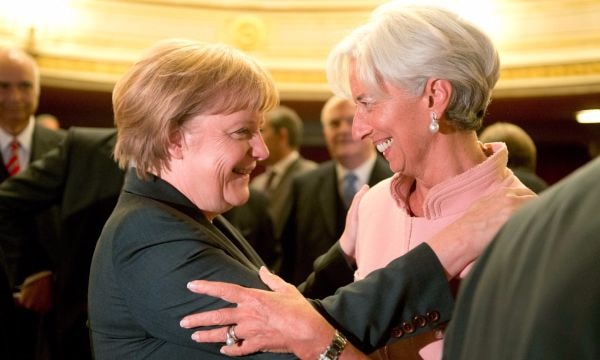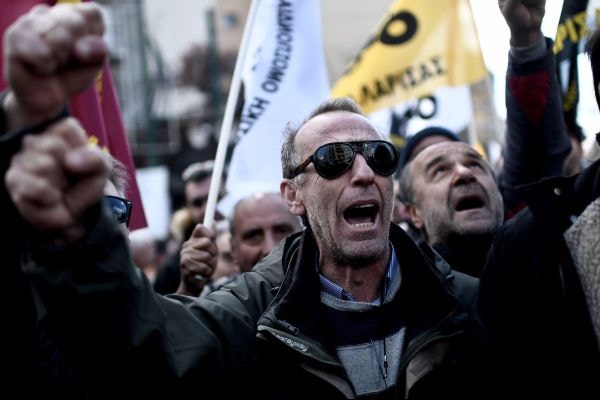Greek debt crisis: Old barriers not yet resolved, new deadlock has come
(Baonghean) - Protests against austerity policies have continued in the Greek capital Athens in recent days as the government considers accepting new reform measures in exchange for an international bailout package. Nearly 10 years have passed, but the road for Greece to escape the crisis is still very precarious. For many reasons, international partners have no other choice but to help the mythical country's economy avoid a collapse.
Forced situation
As scheduled, Greece and its international creditors, the Eurozone and the International Monetary Fund (IMF), are discussing the next steps as Athens faces a 7 billion euro debt payment due this summer.
The worst case scenario is that Greece will not be able to pay its debts if the creditors do not activate the new disbursement in the third bailout package worth 86 billion euros. Because of the deadline and the strict conditions set, the problem in the negotiation becomes difficult to solve, difficult to compromise. Despite everyone understanding that if Greece fails, no one will benefit, even the collapse of the Eurozone is inevitable.
 |
| German Chancellor Angela Merkel and IMF Managing Director Christine Lagarde will be able to find a compromise on a solution for Greece. Photo: Guardian |
The problem is that Greece's debts are all due. This means that without concessions from both debtors and creditors, it will be difficult to solve the difficult problem. The IMF - an important partner in the process of resolving Greece's debt - has not yet officially joined the third bailout package with the Eurozone because of some disagreements. The IMF warned that it would stop participating in the bailout program for Greece because Athens' debt is too large. Meanwhile, the economic targets set by the Eurozone for Greece are unrealistic.
Therefore, this global financial institution believes that they can only continue to disburse loans if Eurozone countries commit to further debt reduction for Greece before disbursing new bailout funds. According to the IMF, even if fully implementing the required reforms, Greece still needs to significantly reduce its debt to achieve sustainable growth and budget targets. But this condition has met with strong opposition from Germany and many creditor countries in the Eurozone.
On the Greek side, Prime Minister Alexis Tsipras’ government has no way back either. The €7 billion obligation due in mid-July is too big a challenge if a compromise with creditors cannot be found. For nearly two years, Greece has implemented reforms and budget commitments. However, the “gift” or new bailout will not be released until Greece passes the current assessment. If all those conditions are met, Greece will have to rely on luck.
That Germany and the Netherlands would only agree to continue if the IMF were fully involved. So the old hurdles were not cleared, a new deadlock has arisen. And this time, the IMF continues to demand more austerity from Greece, despite remaining skeptical of the budget targets set by Europe. This is no different than the government in Athens stirring up a wave of domestic protests against austerity measures.
The bottom line with the EU
After the British vote to leave the EU last year, the EU is facing a new test. The result of this test is whether Greece will remain in the Eurozone or not. In the event that Greece goes bankrupt, or is no longer eligible to join the Eurozone, it will only be a matter of time before it leaves the EU like the UK (Brexit).
If no agreement is reached between now and July, Athens will inevitably default on its debt. So far, there is no other option for Greece than the “lifebuoy” of the EU, the European Central Bank (ECB) and the IMF. But these three institutions seem to be too tired to keep up with the developments in Greece’s debt profile.
Up to this point, they have spent 310 billion euros to help Athens escape. They are also forced into a "jump in, go through" situation because they cannot abandon Greece in dire straits. But if they help this time, it is not certain that they will not have to help again. With the conditions set by this trio of creditors, it can be seen that Greece has not seriously met. Simply because of the pressure of protests from the people in addition to political stability to change the economic and financial situation.
 |
| Greek farmers protest against new taxes during anti-austerity protests last week. Photo: New York Times |
But the EU’s problems don’t end there. There are also differences within the bloc on how to deal with Greece’s debt, whether to reduce its debt or to meet the IMF’s demands to join the EU and ECB. Germany, for example, has the strongest position in the Eurozone on a massive debt reduction for Greece as requested by the IMF.
Along with other countries such as the Netherlands, Berlin has made full participation in the Greek bailout conditional on the IMF. Germany fears that the EU alone will find it difficult to maintain pressure on Greece to implement reforms. If the IMF remains outside the Greek bailout program and only sets conditions, German Chancellor Angela Merkel and Finance Minister Wolfgang Schaeuble will be in a difficult position just months before September elections.
The talks on restructuring Greece’s debt are still ongoing. Now, all sides need to compromise and take more concrete actions if they want to get rid of this debt that has been accumulating for too long. After all, no one wants the debt crisis in Athens to become the key to the survival of the EU.
Thanh Son
| RELATED NEWS |
|---|

